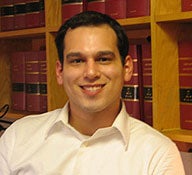The Harvard Law Review has elected second-year student Andrew Manuel Crespo as its 121st president. Crespo was elected from a slate of five candidates.
“I am glad to leave the Law Review in Andrew’s capable hands,” said outgoing president Aileen McGrath. “Andrew is a highly respected member of the organization. His intellectual vision, passion for the law, and dedication to his fellow editors will ensure that the Law Review will have an excellent year.”
Before beginning his studies at Harvard Law School, Crespo graduated from Harvard College in 2005 with an A.B. in Social Studies. He is a native of Monroe, New York, and is the first Latino elected to lead the Review.
“Aileen and her class have been an incredible asset to our organization. They have made wonderful contributions to legal scholarship, and their exceptional dedication to the task has been inspirational,” Crespo said. “I could not be more honored to work with this group of talented, intelligent, and caring editors. The Law Review is a close knit community founded on a 120-year tradition of excellence in legal scholarship; I know the relationships built here will be ones we enjoy for the rest of our lives. I am looking forward to the coming Spring and Summer when we will meet our incoming editors of the Class of 2009, who will help us carry our tradition forward.”
Crespo highlighted the many achievements of the Review during McGrath’s term as president. The Review organized the fall Supreme Court Forum that highlighted the work of Professors Frederick Schauer and Neal Katyal, and cosponsored a conference last March entitled “Results: Legal Education, Institutional Change, and a Decade of Gender Studies” with Harvard’s Journal of Law and Gender and the Civil Rights-Civil Liberties Law Review .
The Law Review, founded in 1887 by future Supreme Court Justice Louis D. Brandeis, is an entirely student-edited journal with the largest circulation of any law journal in the world. For more information on the publication and recent issues, please visit the Harvard Law Review.
